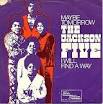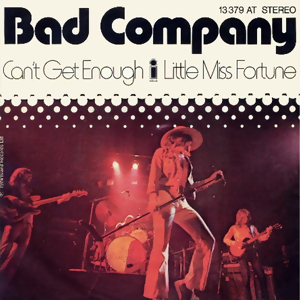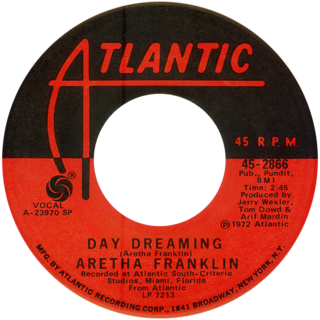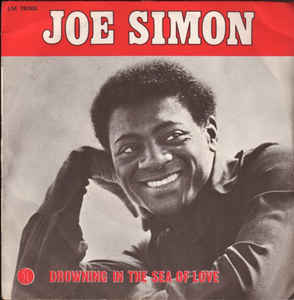Related Research Articles

"TSOP (The Sound of Philadelphia)" is a 1974 recording by MFSB featuring vocals by The Three Degrees. It was written by Gamble and Huff as the theme for the American musical television program Soul Train, which specialized in African American musical performers. The single was released on the Philadelphia International Records label. It was the first television theme song to reach No. 1 on the Billboard Hot 100.

"Never Can Say Goodbye" is a song written by Clifton Davis and originally recorded by the Jackson 5. The song was originally written and intended for the Supremes; however, Motown decided it would be better for the Jackson 5. It was the first single released from the group's 1971 album Maybe Tomorrow, and was one of the group's most successful records. It has been covered numerous times, most notably in 1974 by Gloria Gaynor and in 1987 by British pop group the Communards.
"Mama's Pearl" was a hit recording for The Jackson 5 in 1971 and was written by The Corporation, a songwriting team that had helped the group score four consecutive #1 singles.

"Maybe Tomorrow" is a hit single recorded by American soul family quintet the Jackson 5, in 1971. "Maybe Tomorrow" was included on the Jackson 5's album of the same title, and was also featured on Goin' Back to Indiana. The song was released again in 2009 via a Carl Sturken and Evan Rogers' remix, with an orchestral arrangement by Rob Mounsey, from a compilation album The Remix Suite.

"I Write the Songs" is a popular song written by Bruce Johnston in 1975 and released on his album Going Public in 1977. Barry Manilow's version reached number one on the Billboard Hot 100 chart in January 1976 after spending two weeks atop the Billboard adult contemporary chart in December 1975. It won a Grammy Award for Song of the Year and was nominated for Record of the Year in 1977. Billboard ranked it as the No. 13 song of 1976.

"Rock and Roll All Nite" is a song by American rock band Kiss, originally released on their 1975 album Dressed to Kill. It was released as the A-side of their fifth single, with the album track "Getaway". The studio version of the song peaked at No. 69 on the Billboard singles chart, besting the band's previous charting single, "Kissin' Time" (#89). A subsequent live version, released as a single in October 1975, eventually reached No. 12 in early 1976, the first of six Top 20 songs for Kiss in the 1970s. "Rock and Roll All Nite" became Kiss's signature song and has served as the group's closing concert number in almost every concert since 1976. In 2008, it was named the 16th greatest hard rock song of all time by VH1.

"Can't Get Enough" is the debut single by English rock supergroup Bad Company. Appearing on the band's 1974 self-titled debut album, it is their biggest hit and is considered their most popular song. It reached No. 5 on the Billboard Hot 100 singles chart and No. 1 on Cashbox magazine's Top 100 Singles chart. The song is also frequently played on classic rock radio stations.

"One of These Nights" is a song by the American rock band Eagles, written by Don Henley and Glenn Frey. The title track from their 1975 One of These Nights album, the song became their second single to top the Billboard Hot 100 chart after "Best of My Love" and also helped propel the album to number one. The single version was shortened from the album version of the song, removing most of the song's intro and most of its fade-out, as well. Henley is lead vocalist on the verses, while Randy Meisner sings high harmony on the refrain. The song features a guitar solo by Don Felder that is "composed of blues-based licks and sustained string bends using an unusually meaty distortion tone."

"Saturday in the Park" is a song written by Robert Lamm and recorded by the group Chicago for their 1972 album Chicago V. It was very successful upon release, reaching No. 3 on the Billboard Hot 100, and became the band's highest-charting single at the time, helping lift the album to No. 1. Billboard ranked it as the No. 76 song for 1972. The single was certified Gold by the RIAA, selling over 1,000,000 units in the U.S. alone.

"When Will I See You Again" is a song released in 1974 by American soul group The Three Degrees from their third album, The Three Degrees. The song was written and produced by Kenny Gamble and Leon Huff. Sheila Ferguson sang the lead, accompanied by Fayette Pinkney and Valerie Holiday. Billboard named the song number 67 on their list of 100 Greatest Girl Group Songs of All Time.

"You're the Best Thing That Ever Happened To Me" — also known simply as "Best Thing That Ever Happened To Me" — is a song written by Jim Weatherly, and produced by Don Law. It was first recorded in 1973 by Danny Thomas. Soon after it was done by Ray Price from his album You're the Best Thing That Ever Happened To Me. The song enjoyed two runs of popularity, each by an artist in a different genre.

"Take Me in Your Arms (Rock Me a Little While)" is a song written by the premier Motown songwriting/production team of the 1960s Holland–Dozier–Holland. The first hit recording was sung by Kim Weston in 1965. It was most popular in 1975 when it was recorded by the Doobie Brothers.

"Fire" is a song by R&B/funk band Ohio Players. The song was the opening track from the album of the same name and hit No. 1 on both the Billboard Hot 100 and the Hot Soul Singles chart in early 1975. It spent two weeks atop the soul chart. "Fire" was the Ohio Players' only entry on the new disco/dance chart, where it peaked at No. 10. The song is considered to be the band's signature song along with "Love Rollercoaster".

"Do It ('Til You're Satisfied)" is a popular song by funk group B. T. Express, written by songwriter Billy Nichols.
"Sweet Sticky Thing" is the name of a popular song by funk band Ohio Players, and released on the classic 1975 album, Honey. The song spent a week at number one on the Hot Soul Singles chart. It peaked at number 33 on the Billboard Hot 100 singles chart. It was the third of five songs that they would take to the top of the R&B chart.

"Day Dreaming" is a soul single by American singer Aretha Franklin. Released from her album Young, Gifted and Black, it spent two weeks at the top of the Hot Soul Singles chart in April 1972 and peaked at number five on the Billboard Hot 100 and number 11 on the Easy Listening singles chart. Billboard ranked it as the No. 61 song for 1972.

"Hi-Jack" is a 1974 r&b and funk disco based song written by Spanish musician Fernando Arbex and originally recorded by his group Barrabás for their album ¡Soltad a Barrabás!. While their version of the song was a huge success in their native Spain, going all the way to Number one over there, the song flopped in America, stalling at just number No. 104 on the Bubbling Under the Billboard Hot 100 Charts in July 1975. It was later a hit single for jazz flautist Herbie Mann.

"Love Won't Let Me Wait" is a hit 1975 single by Major Harris, a former member of R&B/soul group The Delfonics. Written by Vinnie Barrett and Bobby Eli, the single is considered to be a staple of classic soul playlists, and was Harris' only entry into the top five on both the soul and pop charts. The single hit number five on the pop chart, and also hit number one on the soul chart for one week. Billboard ranked it as the No. 24 song for 1975. It was awarded a gold disc by the R.I.A.A. on 25 June 1975.
"Third Rate Romance" is a song written by Russell Smith, first recorded in Montreal in 1974 by Jesse Winchester and his band the Rhythm Aces, assisted by Smith. It became a hit the following year by the newly re-formed Amazing Rhythm Aces on its 1975 album Stacked Deck. It was the band's debut single, reaching No.11 on the U.S. country singles chart and No.14 on the Billboard Hot 100, as well as No.1 on the Canadian RPM Country Tracks and Top Singles charts.

"Drowning in the Sea of Love" is a 1971 song recorded by Joe Simon for Spring Records. It was the title track of his seventh LP, and was the first release from the album. The song was written by Kenny Gamble and Leon Huff.
References
- ↑ Breithaupt, Don; Breithaupt, Jeff (October 15, 1996). "Boogie Down: The Dawn of Disco". Precious and Few - Pop Music in the Early '70s. St. Martin's Griffin. p. 183. ISBN 031214704X.
- ↑ Whitburn, Joel (2004). Top R&B/Hip-Hop Singles: 1942-2004. Record Research. p. 528.
- ↑ White, Adam; Bronson, Fred (1993). The Billboard Book of Number One Rhythm & Blues Hits. New York: Billboard Books: Watson-Guptill Publications. p. 163.
- ↑ "RPM Magazine - July 5, 1975 (page 23)" (PDF).